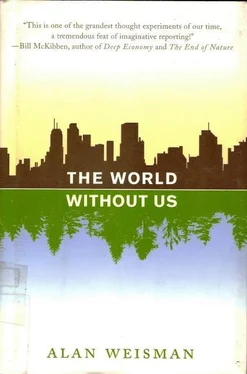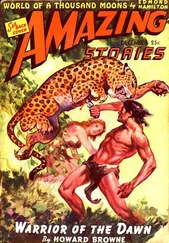Unlikely perhaps, but for the sake of argument, not impossible. Say a Homo sapiens- specific virus—natural or diabolically nano-engineered—picks us off but leaves everything else intact. Or some misanthropic evil wizard somehow targets that unique 3.9 percent of DNA that makes us human beings and not chimpanzees, or perfects a way to sterilize our sperm. Or say that Jesus—more on Him later—or space aliens rapture us away, either to our heavenly glory or to a zoo somewhere across the galaxy.
Look around you, at today’s world. Your house, your city. The surrounding land, the pavement underneath, and the soil hidden below that. Leave it all in place, but extract the human beings. Wipe us out, and see what’s left. How would the rest of nature respond if it were suddenly relieved of the relentless pressures we heap on it and our fellow organisms? How soon would, or could, the climate return to where it was before we fired up all our engines?
How long would it take to recover lost ground and restore Eden to the way it must have gleamed and smelled the day before Adam, or Homo habilis, appeared? Could nature ever obliterate all our traces? How would it undo our monumental cities and public works, and reduce our myriad plastics and toxic synthetics back to benign, basic elements? Or are some so unnatural that they’re indestructible?
And what of our finest creations—our architecture, our art, our many manifestations of spirit? Are any truly timeless, at least enough so to last until the sun expands and roasts our Earth to a cinder?
And even after that, might we have left some faint, enduring mark on the universe; some lasting glow, or echo, of Earthly humanity; some interplanetary sign that once we were here?
For a sense of how the world would go on without us, among other places we must look to the world before us. We’re not time travelers, and the fossil record is only a fragmentary sampling. But even if that record were complete, the future won’t perfectly mirror the past. We’ve ground some species so thoroughly into extinction that they, or their DNA, will likely never spring back. Since some things we’ve done are likely irrevocable, what would remain in our absence would not be the same planet had we never evolved in the first place.
Yet it might not be so different, either. Nature has been through worse losses before, and refilled empty niches. And even today, there are still a few Earthly spots where all our senses can inhale a living memory of this Eden before we were here. Inevitably they invite us to wonder how nature might flourish if granted the chance.
Since we’re imagining, why not also dream of a way for nature to prosper that doesn’t depend on our demise? We are, after all, mammals ourselves. Every life-form adds to this vast pageant. With our passing, might some lost contribution of ours leave the planet a bit more impoverished?
Is it possible that, instead of heaving a huge biological sigh of relief, the world without us would miss us?
PART I

CHAPTER 1

A Lingering Scent of Eden
YOU MAY NEVER have heard of the Białowieża Puszcza. But if you were raised somewhere in the temperate swathe that crosses much of North America, Japan, Korea, Russia, several former Soviet republics, parts of China, Turkey, and Eastern and Western Europe—including the British Isles—something within you remembers it. If instead you were born to tundra or desert, subtropics or tropics, pampas or savannas, there are still places on Earth kindred to this puszcza to stir your memory, too.
Puszcza, an old Polish word, means “forest primeval.” Straddling the border between Poland and Belarus, the half-million acres of the Białowieża Puszcza contain Europe’s last remaining fragment of old-growth, lowland wilderness. Think of the misty, brooding forest that loomed behind your eyelids when, as a child, someone read you the Grimm Brothers’ fairy tales. Here, ash and linden trees tower nearly 150 feet, their huge canopies shading a moist, tangled understory of hornbeams, ferns, swamp alders and crockery-sized fungi. Oaks, shrouded with half a millennium of moss, grow so immense here that great spotted woodpeckers store spruce cones in their three-inch-deep bark furrows. The air, thick and cool, is draped with silence that parts briefly for a nutcracker’s croak, a pygmy owl’s low whistle, or a wolf’s wail, then returns to stillness.
The fragrance that wafts from eons of accumulated mulch in the forest’s core hearkens to fertility’s very origins. In the Białowieża, the profusion of life owes much to all that is dead. Almost a quarter of the organic mass aboveground is in assorted stages of decay—more than 50 cubic yards of decomposing trunks and fallen branches on every acre, nourishing thousands of species of mushrooms, lichens, bark beetles, grubs, and microbes that are missing from the orderly, managed woodlands that pass as forests elsewhere.
Together those species stock a sylvan larder that provides for weasels, pine martens, raccoons, badgers, otters, fox, lynx, wolves, roe deer, elk, and eagles. More kinds of life are found here than anywhere else on the continent—yet there are no surrounding mountains or sheltering valleys to form unique niches for endemic species. The Białowieża Puszcza is simply a relic of what once stretched east to Siberia and west to Ireland.
The existence in Europe of such a legacy of unbroken biological antiquity owes, unsurprisingly, to high privilege. During the 14th century, a Lithuanian duke named Władysław Jagiełło, having successfully allied his grand duchy with the Kingdom of Poland, declared the forest a royal hunting preserve. For centuries, it stayed that way. When the Polish-Lithuanian union was finally subsumed by Russia, the Białowieża became the private domain of the tsars. Although occupying Germans took lumber and slaughtered game during World War I, a pristine core was left intact, which in 1921 became a Polish national park. The timber pillaging resumed briefly under the Soviets, but when the Nazis invaded, a nature fanatic named Hermann Goring decreed the entire preserve off-limits, except by his pleasure.
Following World War II, a reportedly drunken Josef Stalin agreed one evening in Warsaw to let Poland retain two-fifths of the forest. Little else changed under communist rule, except for construction of some elite hunting dachas—in one of which, Viskuli, an agreement was signed in 1991 dissolving the Soviet Union into free states. Yet, as it turns out, this ancient sanctuary is more threatened under Polish democracy and Belarusian independence than it was during seven centuries of monarchs and dictators. Forestry ministries in both countries tout increased management to preserve the Puszcza’s health. Management, however, often turns out to be a euphemism for culling—and selling—mature hardwoods that otherwise would one day return a windfall of nutrients to the forest.

IT IS STARTLING to think that all Europe once looked like this Puszcza. To enter it is to realize that most of us were bred to a pale copy of what nature intended. Seeing elders with trunks seven feet wide, or walking through stands of the tallest trees here—gigantic Norway spruce, shaggy as Methuselah—should seem as exotic as the Amazon or Antarctica to someone raised among the comparatively puny, second-growth woodlands found throughout the Northern Hemisphere. Instead, what’s astonishing is how primally familiar it feels. And, on some cellular level, how complete.
Читать дальше












